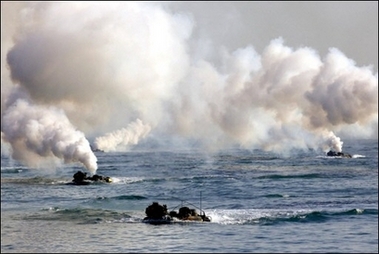N. Korea, US discuss nukes
Updated: 2006-12-20 15:53
BEIJING - US and North Korean diplomats met face-to-face Tuesday to discuss international efforts to get the country to give up its nuclear arms program and the North Korea's demand for Washington to stop trying to freeze it out of the global banking system.
|
|
US officials gave no indication of any progress after the first two days of talks. The negotiations have failed over more than three years of meetings to dismantle the North Korea's atomic weapons program - or prevent its first nuclear test explosion Oct. 9.
"We don't have really any breakthroughs to report," US Assistant Secretary of State Christopher Hill said Tuesday after meeting with a North Korean delegation on the nuclear weapons issue. Financial experts discussed the banking restrictions separately. Hill was hold a second one-on-one meeting with the North Koreans Wednesday.
Hill has declined to release details of any US proposals to North Korea, but a news report Wednesday said the Americans had outlined a process whereby Pyongyang would first freeze its nuclear program, followed by inspections and eventual dismantlement.
Washington would be willing to give the North a written security guarantee - a pledge that it wouldn't seek to topple the government by force - as soon as it allows the return of international nuclear inspectors, South Korea's Yonhap news agency said, citing "diplomatic sources" at the talks.
South Korean nuclear negotiator Chun Yung-woo declined to confirm specifics, but said the ideas were simply "an official detailed and concrete proposal" of what the sides had previously discussed.
Before the start of the third day of meetings Wednesday, Hill stressed that delegates from the six countries - China, Japan, Russia, the US and the two Koreas - should start working on a draft agreement if they hoped to make any progress at this round.
"If we are going to get to the end of the week and have something tangible, I think we probably need to be working at something on paper in the very near future," he said.
Earlier, he said a failure in the talks could lead to more sanctions against Pyongyang.
North Korea entered the talks by restating its long-held demands, emboldened by its confirmed nuclear status and raising doubts about chances for a quick resolution of the standoff that began in late 2002.
The impoverished country pledged in September 2005 to abandon its nuclear arms program in exchange for security guarantees, diplomatic recognition and economic aid.
But just days before that agreement, the US blacklisted a Macau bank where the Pyongyang government held accounts, charging it was aiding the country's alleged counterfeiting of US$100 bills and money laundering. The US also urged other countries to bar North Korean accounts.
| 1 | 2 |  |
| ||
|
||
|
||
|
|

